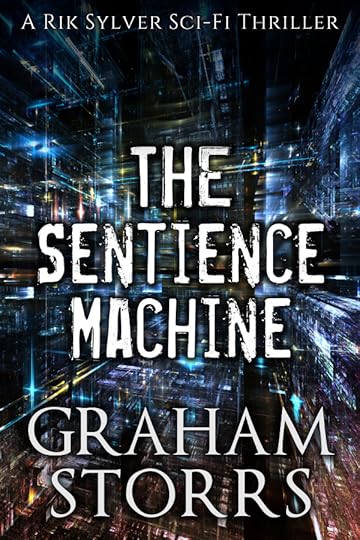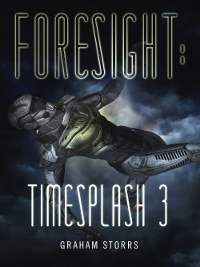Graham Storrs's Blog, page 4
January 21, 2015
Cover Reveal: The Sentience Machine
The Sentience Machine is a fast-paced science fiction thriller and number two in the Rik Sylver series. It goes on sale on Feb 2 at all your favourite online book shops. But before that happens, let me show you what it will look like.

You may be interested to know that this is the very first time I have commissioned a cover for one of my novels (as opposed to commissioning artwork and then incorporating it myself into a cover design). It’s by the same person and the same company that did the design for The Credulity Nexus, Dwell Design & Press (click to see how that came about). The whole process was quick and easy, and less expensive than I feared it might be.
So what do you think of the end result?
January 18, 2015
Wisdom
If you’re on social media these days, a large proportion of what you see there purports to be wisdom. You know, the kind of thing that finds its way onto your Twitter stream every few minutes:
“Assume good intent and you won’t find it where there is none; assume bad intent and you will find it everywhere.”
or on Facebook in the form of a cute image:
These quotations, these inspirational mottoes, these pithy condensations of experience, are everywhere you look. They range from the completely banal to the infuriatingly wrong, from the vague and wooly expression of feel-good sentiment, to ideologically-motivated statements of wishful thinking. I could give you endless examples of all of these but, instead giving this stuff even more air time, I refer you to these pages and the thousands like them.

All bollocks it is.
It’s not that I disagree with all of these sentiments. Some seem quite sensible and credible. Such nuggets of wisdom, sifted from the life experience of intelligent people who have striven to express the lessons they have learned, can’t help but be interesting, challenging, even useful in rare instances, but the nuggets are mixed in with countless tonnes of worthless gravel. And, even when I find one, I have to ask myself three big questions:
1. Is there any well-documented, precisely observed, rigorously controlled, analysed and reviewed evidence for this assertion, or is all I have to go on the opinion of the person who said it?
2. Are there things I know, is there other evidence I can bring to bear, is there a chain of argument I can find, to help me judge whether this assertion is true or false?
3. Even if it is true, do I understand clearly the circumstances in which it might be true, and the circumstances in which it might be false?
I can’t help it; I have a sceptical mind. If someone says to me, “A positive attitude will lead to positive outcomes.” I think, “How do they know? Surely this is an empirical question? You can measure the positivity of people’s attitudes and you can measure the positivity of outcomes (although it’s all going to take a LOT of operationalising your definitions!). Someone must have done some relevant scientific studies.”
And yet, I know that for most assertions people make there will never be the kind of evidence that I like to see. Most of these assertions are just not the kind of thing there can be evidence for. Either they are statements of belief (or wishful thinking) based on religious or other superstitious thinking. Statements like, “We are here to heal, not harm. We are here to love, not hate. Etc.,” are entirely metaphysical and there is no evidence in the world that can ever verify or refute them. You have to take it on faith – or reject it. Then there are statements which try to shift our perspective on life – usually by attempting to redefine a word so that it means something nicer than it used to. For example, “Greatness is not found in possessions, power, position or prestige. It is discovered in goodness, humility, service and character.” I suppose this is so that people with no possessions, power, position or prestige can still tell themselves they are “great”, as well as being an exhortation to be good, humble, give service and have character. Which all assumes that people want to believe they are “great”. The ploy is meant to be subversive but I can’t see how it could work. If you start defining “greatness” so that it encompasses people with no possessions, power, position or prestige, we’ll just need another word for the people who have them (“one-percenters”, anybody?)

Probably unwise.
Before the rise of science, wisdom was all we had. Individuals would live a long and full life, read the conclusions of other individuals, and, if they were very clever and disposed to be contemplative, come up with some distillation of what they had learned about themselves, the world, and other people. There was some possibility of an accumulation of wisdom (because of the writing things down thing) but, since your access to the experiences of anyone else was extremely limited, it was hard to judge the quality of their conclusions. So, every piece of wisdom was generated anew in each generation, everything that had ever been said before (and written down) filtered through the narrow channel of a new individual’s experience and intelligence. It is hardly surprising that we still find many profound and apparently true statements that were uttered thousands of years ago by Greek or Chinese philosophers. The fact is that wisdom is a very, very limited kind of knowledge and one that is not cumulative in the way that scientific knowledge is.
It’s also extremely difficult to judge the quality of wisdom. An unsourced quotation is almost useless. All you have to go on are the words themselves. With wisdom, it helps to know something about the person who said those words so you can judge the context in which they were said and gauge the range of application they might have. This is nowhere more true than in the field of politics. “All men are created equal,” is the kind of statement where knowing the speaker and the context really helps you understand what on earth might have been meant by such a bizarre assertion.
And on social media, there is just so much wisdom, most of it completely ridiculous, that the little real truth in there is lost – probably forever. It seems to me that the Internet has killed off wisdom. Any vaguely profound-sounding statement made by anybody at all, regardless of their qualifications, flies around and around the aether like snowflakes in a blizzard. Wisdom has been so devalued we might all as well read advertising slogans as pay any attention to this stream of nonsense. Read it for entertainment, by all means (or read Christmas cards, they’re just as good) but please don’t take it seriously. Wisdom was never particularly good; it was just the best we had at the time. Now, thank Galileo, we have science and the (provisional) knowledge it produces is the only kind that has any value any more.

Warning: Science might not make you happy.
January 16, 2015
The Sentience Machine is Coming
I hope to be able to show you the cover for the second of my Rik Sylver novels sometime next week. The book – The Sentience Machine – is the sequel to The Credulity Nexus.
Two years have passed since Rik became involved in the credulity nexus affair and things are looking up for him – until his old nemesis, Rivers Valdinger, shows up with a message from Omega Point. Rivers is a “zombie” – the mind of a dead human uploaded into a powerful robot body. Omega Point is a “ghost farm” a satellite, orbiting the Sun, with the disembodied minds of 20,000 dead rich people living inside its virtual world. The message is that Omega Point is under attack by an unknown enemy and Martin Lanham, the uberghost who runs Omega Point, is holding one of Rik’s friends hostage until Rik finds out who the culprit is. Once again, Rik and Rivers become unlikely allies as they track down the perpetrator. Once again, they soon find themselves tangled up in a web of lies and misdirection, prejudice, deadly danger, and high-level corruption, as they stumble towards a discovery that neither of them could have foreseen.
If you’ve been following the saga of the cover for The Credulity Nexus, you’ll know that it recently had a makeover by Dwell Design & Press. This proved to be so popular, I’ve commissioned the second book’s cover from them too. As soon as it’s ready, you’ll be the first to see it.
January 8, 2015
Can You Judge a Book by its Cover?
Like most writers, I often wonder about the efficacy of good cover design. From all directions, I hear the assertion that good covers sell books and bad covers cost sales. Yet I have never seen any real evidence to support this belief (a scientific study, for example), just anecdotes and more assertions. Clearly, to some, it seems self-evident but to me it does not. I can see the reasoning behind it, I can understand that some cover styles may be genre-appropriate (or, at least, typical) while some are not, but even the best reasoning can never be as good as hard evidence.
I was having this debate recently with some fellow writers – all of whom are completely convinced that covers sell books or cost sales. I was the only sceptic. Naturally, talk turned to the quality of our own covers and I took some flack for constructive criticism of the Timesplash series covers and for the cover of my self-published novel, The Credulity Nexus (read all about it). While I didn’t have much input into the Timesplash covers, The Credulity Nexus design was all my own work (the artwork and fonts came from other people, I just put it all together).
Then someone suggested that one of the cover designers in our group (yes, some people can design covers for a living and write books) should redesign The Credulity Nexus cover, I should put it on the book and then we should look at how sales are affected. Intrigued, I agreed. Also, similarly intrigued, writer Leigh K. Hunt (who does cover design under the business name Dwell Design & Press) did a new cover and kindly donated it for the purpose.
Here are the two covers. On the left is the original amateur design, and on the right is the new professional design.


The difference is pretty striking, isn’t it? The old design was rather dark, gothic and a bit sinister. The new design is brighter, technological and emotionally neutral. But will the change affect sales? Only time will tell. As of today, the book is for sale on Amazon, Smashwords and Kobo (other retailers to follow in due course) with the new cover. If you haven’t bought The Credulity Nexus – either because the cover put you off, or because it just didn’t attract you enough – you may be feeling the urge to change your mind. On the other hand, you might just want to buy a copy to mess with my head. Either way is fine.
Whatever, I’d be very interested in your views on these covers. Does one make you want to buy one more than the other? In fact, I’m interested to hear what you think about book covers in general – especially if you actually have some real evidence to support or refute the popular view that covers make a real difference to sales.
January 7, 2015
Try Sci-fi 365
Just a quick post to say that, if you’re a sci-fi fan, you might like to sign up to scifi365.net. It’s a free book recommendation site. They send you an email now and again recommending sci-fi books by new and upcoming authors. The books are at reduced prices and the Sci-fi 365 team has actually read the books and gives a pithy review.
If you’re a sci-fi author you might want to try it too. I’ve had three recommendations from them since I signed and I bought two of them. My own novel, Heaven is a Place on Earth (which is on offer at the moment at just 99c), went out in their mailshot a couple of days ago and has done very well – something I cannot say for any other book recommendation site I have tried. My guess is, they are targeting the right readers.
As a sci-fi reader, finding good novels in the genre is extremely difficult. As a writer, finding ways to help readers discover my books is even harder. I look forward to the day when there are many high quality recommendation services out there that will make both these jobs easier. To paraphrase the scifi365 site, what we all need is more signal and less noise.
Here is what they said about Heaven:
Storr’s premise – ‘how would society function if augmented reality became the norm’ – is a strong one and he handles the idea logically and consistently, making ‘Heaven Is A Place On Earth’ a joy to read.
Oh, and the twist at the end of the novel is one we didn’t see coming.
All unprompted and all for free. And, no, I have no affiliation whatsoever with these guys except as a consumer of their services.
January 3, 2015
Another Promo, I’m Afraid
Hot on the heels of the highly successful 99c sale of The Credulity Nexus (now back to its normal price of USD4.99 – but definitely worth it) I’m having another promotion. This time my augmented reality thriller, Heaven is a Place on Earth, is about to be knocked down to 99c. It’s already available at that price on Amazon Kindle stores around the world and at Smashwords and Kobo (but the other retailers may take a few days to catch up).
If you’re wondering what augmented reality is, just think about phone apps like Layar for Android or the Google Glass phenomenon. Then imagine that technology embedded in your brain so that computers can overlay everything you see or hear or feel with additional information. It seems like a natural extension of where mobile computing is moving. First these things are carryable, like smartphones. then they’re wearable, like Google Glass and the various “smart” watches that have come onto the market recently, eventually they will be embedded into our bodies and our brains.
 In Heaven is a Place on Earth, set perhaps eighty years in the future, this whole process has run to completion. Everyone lives in a world where augmentation is always on. Everyone you meet is surrounded in a cloud of information about them. Everyone who meets you sees a better, more attractive you. The world is cleaner, tidier, your garden may be full of weeds but all anyone sees are flowers. You are embedded in networks that monitor the world, and enhance the world. People no longer travel about much. Everything you need is delivered by robot machines to your door. You meet people and do your work in virtual worlds, completely immersed in the illusion, sitting at home in sealed tanks so that there are no distractions, drip-fed your meals through catheters permanently embedded in your arm.
In Heaven is a Place on Earth, set perhaps eighty years in the future, this whole process has run to completion. Everyone lives in a world where augmentation is always on. Everyone you meet is surrounded in a cloud of information about them. Everyone who meets you sees a better, more attractive you. The world is cleaner, tidier, your garden may be full of weeds but all anyone sees are flowers. You are embedded in networks that monitor the world, and enhance the world. People no longer travel about much. Everything you need is delivered by robot machines to your door. You meet people and do your work in virtual worlds, completely immersed in the illusion, sitting at home in sealed tanks so that there are no distractions, drip-fed your meals through catheters permanently embedded in your arm.
It might seem an unpleasant or even frightening future but it is entirely plausible and many technical and social trends are moving us in that direction.
But who are the misfits, the criminals, the terrorists in this new world? Not our protagonist, Ginny, that’s for sure. She’s just a woman trying to make a living writing soundscapes for virtual worlds. But her life is about to become a nightmare.
She has only dated Cal Coplin a couple of times when the police arrive to question her about him. He’s disappeared – something that should be completely impossible in a world where everyone is electronically tagged. And then she receives a recorded message from Cal, asking her to deliver a small package for him. Her decision to help him plunges Ginny into a world of fear, corruption, and massive deception. On the run from the police, a dangerous terrorist organisation, and a shadowy corporation, Ginny struggles to stay alive and free while she tries to understand what is happening and prevent a deadly attack on the government. But in a world dominated by augmented and virtual realities, nothing is as it seems, and the deception runs deeper than anyone could imagine.
You can get this glimpse into a strange and disturbing future for just 99c while the promo lasts. So grab your copy now from the Kindle store, or Smashwords, or Kobo.
December 29, 2014
Start 2015 With a Whole Load of 99c Books
I’ve mentioned this once or twice now, I know, but Jan 1, 2015 is Patty Jansen’s Mega 99c SFF Book Sale. 47 sci-fi and fantasy authors have put up over 50 books in this great special offer. My own novel, The Credulity Nexus, is in there but I’m pretty sure you can find plenty to suit your taste. I will be buying 10 of these books myself. Ten great sci-fi novels for just $9.90!
 So let me tell you about The Credulity Nexus. It’s a space opera – or, at least, the first book in a long series of space operas that start in the near future on Earth, the Moon and various space stations, and then move out beyond the Solar System to draw in other worlds and other species. There will be nine books in all, covering a span of ten thousand years.
So let me tell you about The Credulity Nexus. It’s a space opera – or, at least, the first book in a long series of space operas that start in the near future on Earth, the Moon and various space stations, and then move out beyond the Solar System to draw in other worlds and other species. There will be nine books in all, covering a span of ten thousand years.
The Credulity Nexus, indeed, the first three books, are based around the fumbling efforts of Moon-based private investigator Rik Sylver to keep himself and his friends alive as he is drawn ever deeper into the machinations of the transhuman inhabitants of Omega Point, a gigantic orbiting computer stuffed with the uploaded minds of 20,000 dead people. The transhumans have plenty of enemies on Earth, some of them very wealthy and very dangerous. And Rik finds himself being used and abused by both sides – and far too busy fighting fires to fight back.
The Credulity Nexus is populated with some of my favourite characters. Rik himself is a big, tough lovable type, straight as an arrow but prone to making bad decisions that land him and everyone around him in serious trouble. And one of those bad decisions was to courier a package for a client who turns out to be a deranged trillionaire, to discover the nightmare it contains, and then to lose it. Taking point for the transhumans is a woman called Rivers Valdinger, a one-time thief, now uploaded into a sophisticated robot body so that she can do the grunt work – sometimes the wet work – for her puppet-masters in Omega Point. And first on her to-do list is to steal a weaponised genetic modifier known as the credulity nexus. And if that means going through Rik Sylver to get it, that’s fine with her.
Ah well, I’ll let you discover these guys for yourself. The second part of the series (The Sentience Machine) will be released on Feb 2, which should give you plenty of time to read the first one.
Remember, it all starts on Jan 1 at Patty Jansen’s Mega 99c SFF Book Sale.
December 26, 2014
Mega SFF Book Sale on Jan 1
Aussie author Patty Jansen has organised a bunch of us (about 50 authors) to put one work each into a maga sale of sci-fi and fantasy novels that will take place here: http://pattyjansen.com/blog/mad-science-fiction-january-sale/ on Jan 1, 2015.
Every book in the sale is just 99c which means you could stuff your Kindle with an excellent collection of SFF novels for peanuts – enough to keep you in reading for the rest of the year!
So, bookmark the site, mark the date in your calendar, and head there on Jan 1.
And yes, I do have a book in the sale – The Credulity Nexus – the first book in my Placid Point meta-trilogy. So, if you like space opera and sci-fi thrillers, that’s another reason to head for the sale on Jan 1.

This is what you’ll see. Don’t forget to scroll all the way to the bottom!
December 20, 2014
The Credulity Nexus at 99c for Christmas Period
 As of tomorrow, The Credulity Nexus will be on sale for just USD 0.99c (Kindle store only). This special offer will run until the middle of January, so don’t miss it.
As of tomorrow, The Credulity Nexus will be on sale for just USD 0.99c (Kindle store only). This special offer will run until the middle of January, so don’t miss it.
The Credulity Nexus is the first book in the Rik Sylver series and also the first of my novels set in my Placid Point meta-trilogy (that’s a trilogy of trilogies), a space opera starting in the near future and spanning ten thousand years!. Moving between the Earth, the Moon and the Omega Point “brain farm”, this is a fast-paced science fiction thriller with plenty of plot twists.
Book two, The Sentience Machine, will be released on February 2, 2015. Which means you can buy book one at this Christmas bargain rate and just have time to read it before book two comes out.
October 9, 2014
Time Travel Again With FORESIGHT: Timesplash 3
My latest novel has hit the virtual shelves. FORESIGHT, the third novel in the Timesplash series, is available to buy now from your favourite online book shop. If you want to read more about it, or to jump straight to said favourite online book shop, just visit my FORESIGHT page. It’s all there.

FORESIGHT: Timesplash 3
People who have read the book already, tell me it is the best of the series. I must say, I’m very fond of it and I really feel as if, with each new Timesplash novel, I’m getting more and more into my stride. Of course, Jay and Sandra, and their daughter, Cara, are like old friends to me now. In any given situation, I know exactly what each of them would say or do, and it has been a great ride being there with them through their many trials and traumas.
So, is FORESIGHT the last Timesplash novel? Well, I honestly don’t know. There was never meant to be more than one of them. The original Timesplash was written as a stand-alone story. And now I have a trilogy. If you read it, I hope you’ll agree that the tale could easily end right there at the end of FORESIGHT. However, I’ve learned never to say never when it comes to this series. So I’ll just say I have many, many other books I want to write and worlds I want to explore (like Placid Point, for example) and I may leave the long-suffering Sandra and Jay alone for a while now.
Of course, I can’t promise to leave time travel alone. I have another time travel novel that I want to get out there next year – something quite unlike the Timesplash books. Doodling with strap lines for it I came up with, “Being insane and being visited by an amoral jerk from the future are not all that different.” It doesn’t tell you much about the book, but it definitely gives the flavour of the thing. So, look out for that one – and the second book in the Rik Sylver series (The Sentience Machine). Meanwhile, grab FORESIGHT, or the whole Timesplash series if you don’t have it yet, and I hope you have a great time reading it.




